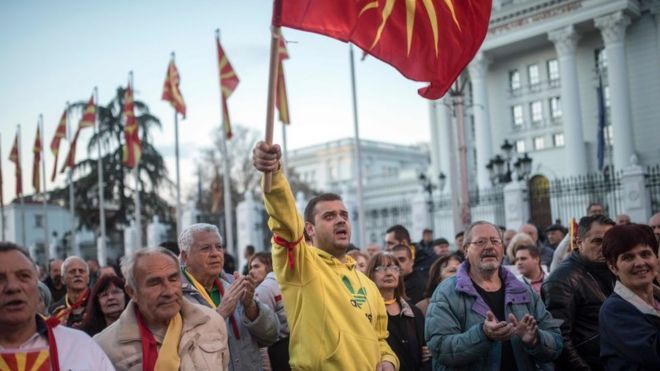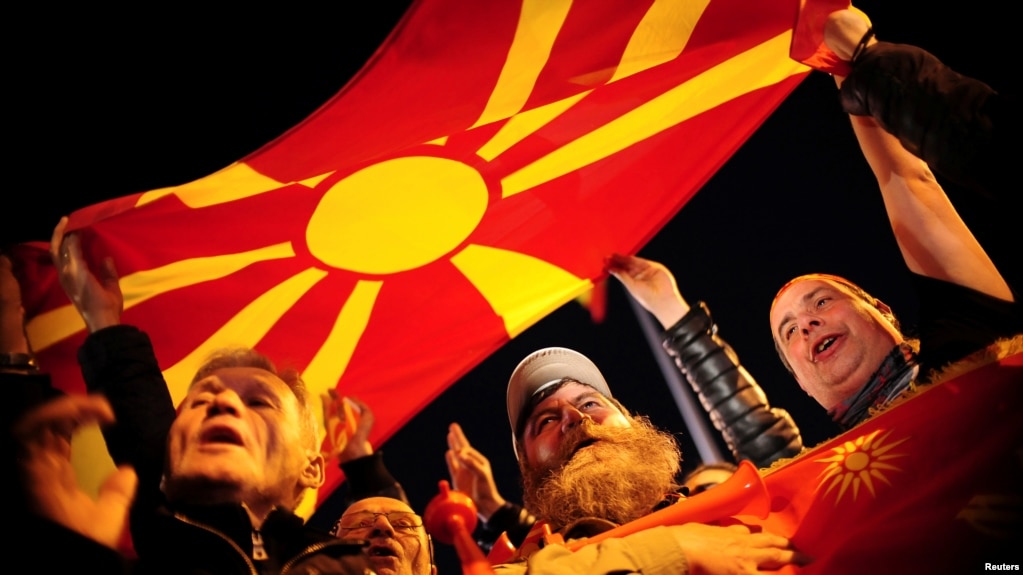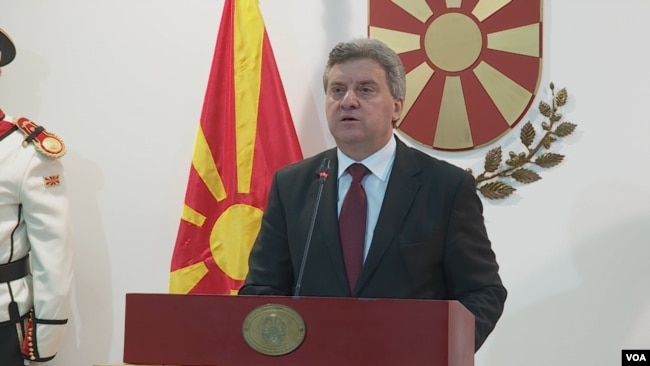Last year (as we were preparing to travel to Macedonia) I had posted about the early parliamentary elections that were being held in December 2016 (following a two-year political crisis).
Unfortunately, it has been three months since those early elections - and still there is no new government formed.
Here is the latest on the most recent attempt to form a government (and the protests that it inspired).
Perspectives from the BBC, Radio Free Europe and Reuters:
From the BBC:
http://www.bbc.com/news/world-europe-39132147
Macedonia's president blocks new coalition government

Getty Images
Macedonian President Gjorge Ivanov
has refused to grant a coalition of Social Democrats and ethnic Albanian
parties a mandate to form a government.
"I cannot give the mandate to somebody who threatens the sovereignty of Macedonia," said President Ivanov. Social Democrat leader Zoran Zaev formed the coalition after agreeing to support a bill making Albanian the country's second official language.
Thousands of Macedonians have been protesting against the bill.
An official from the Albanian Democratic Union of Integration (DUI), which had hoped to join the coalition, said the situation was "chaos".
The former Yugoslav republic has been in political crisis for two years following a phone-tapping scandal.
December's general elections were brought forward two years as part of a Western-brokered agreement, but failed to produce an outright winner.
The results between the governing VMRO-DPMNE party and the Social Democrats (SDSM) were so close that both parties initially claimed victory.
Forming a coalition with minority parties has been their only way forward.
The VMRO-DPMNE, which won two more seats than the opposition, has already tried but failed to form an alliance.
Macedonia came close to civil war in 2001 after an Albanian uprising.
Ethnic Albanians make up around a quarter of the country's population.
An article published by Voice of America, from Reuters:
Macedonia's President Blocks Social Democrat Government in Albanian Language Row

Protesters shout slogans while holding a Macedonian
flag during demonstrations against an agreement that would ensure the
wider use of the Albanian language in the ethnically divided state, in
Skopje, Macedonia, Feb. 28, 2017.
SKOPJE —
Macedonia's president has refused to allow a coalition of Social
Democrats and ethnic Albanian parties to form a government because of
its pledge to allow wider official use of the Albanian language.
The move by Macedonian President Gjorge Ivanov was criticized by the European Union.
In a snap election in December, the nationalist VMRO-DPMNE won 51 seats to the Social Democrats' 49, leaving neither able to form a government without parties representing ethnic Albanians, who make up a third of the population.
Social Democrat leader Zoran Zaev last week won support of three ethnic Albanian parties in the parliament after agreeing to support a bill to enable wider use of the Albanian language, a deal that triggered street protests in Skopje.

The VMRO-DPMNE had already tried but failed to form a coalition.
Macedonia, once a republic in the former Yugoslavia, wants to join the EU, but Johannes Hahn, European commissioner for enlargement, was unimpressed by Ivanov's decision, "In a democracy, one must acknowledge parliamentary majorities, even if one doesn't like them," Hahn said on Twitter.
Alarming decision
Macedonia's relations with its Albania minority have long been difficult. It reached the brink of civil war during an ethnic Albanian insurgency in 2001, before EU and other diplomacy defused the situation.
Following December's vote, leaders of ethnic Albanian parties traveled to Tirana in Albania and agreed to a joint platform for negotiating with a coalition including demanding wider use of Albanian language.
Macedonia's nationalists, including former prime minister Nikola Gruevski, said the demand was unconstitutional.
Ethnic Albanian party Besa said Ivanov's decision was "alarming" and "a potential danger for the Albanian community in Macedonia."
In Skopje, thousands had protested Zaev's deal. The protests, which started on Monday, spread on Wednesday to all major towns where Macedonians make up the majority.
From Radio Free Europe
http://www.rferl.org/a/macedonia-president-refuses-to-give-oppositioon-leader-mandate-government/28341718.html

The move by Macedonian President Gjorge Ivanov was criticized by the European Union.
In a snap election in December, the nationalist VMRO-DPMNE won 51 seats to the Social Democrats' 49, leaving neither able to form a government without parties representing ethnic Albanians, who make up a third of the population.
Social Democrat leader Zoran Zaev last week won support of three ethnic Albanian parties in the parliament after agreeing to support a bill to enable wider use of the Albanian language, a deal that triggered street protests in Skopje.

FILE - Macedonian President Gjorge Ivanov
"I cannot give the mandate to somebody who threatens the sovereignty of Macedonia," Ivanov told reporters.The VMRO-DPMNE had already tried but failed to form a coalition.
Macedonia, once a republic in the former Yugoslavia, wants to join the EU, but Johannes Hahn, European commissioner for enlargement, was unimpressed by Ivanov's decision, "In a democracy, one must acknowledge parliamentary majorities, even if one doesn't like them," Hahn said on Twitter.
Alarming decision
Macedonia's relations with its Albania minority have long been difficult. It reached the brink of civil war during an ethnic Albanian insurgency in 2001, before EU and other diplomacy defused the situation.
Following December's vote, leaders of ethnic Albanian parties traveled to Tirana in Albania and agreed to a joint platform for negotiating with a coalition including demanding wider use of Albanian language.
Macedonia's nationalists, including former prime minister Nikola Gruevski, said the demand was unconstitutional.
Ethnic Albanian party Besa said Ivanov's decision was "alarming" and "a potential danger for the Albanian community in Macedonia."
In Skopje, thousands had protested Zaev's deal. The protests, which started on Monday, spread on Wednesday to all major towns where Macedonians make up the majority.
From Radio Free Europe
http://www.rferl.org/a/macedonia-president-refuses-to-give-oppositioon-leader-mandate-government/28341718.html
Macedonia's President Refuses To Give Opposition Leader Mandate For New Government

SDSM leader Zoran Zaev (left) and Macedonian President Gjorge Ivanov
SKOPJE -- Macedonia's President Gjorge Ivanov says he has decided he
will not give a mandate to Social Democratic Union (SDSM) leader Zoran
Zaev to try to form a government, despite documents presented by Zaev
showing he has formed a coalition that would control a majority of seats
in parliament.
Ivanov -- a member of the nationalist VMRO-DPMNE party -- made the announcement at a press conference in Skopje on March 1.
Zaev on February 27 presented signatures from three ethnic Albanian political parties to Ivanov -- showing he has support from a total of 67 lawmakers in the 120-seat parliament to form a new government.
But under Macedonia's constitution, the president must present a potential coalition leader with a mandate to form a government before the proposed government is voted upon by parliament.
READ MORE: Violence Mars Second Night Of Macedonian Protests Over Albanian Demands
The ethnic Albanian parties have made their support for Zaev's
proposed coalition government conditional on the enactment of a law that
backs broader use of the Albanian language in Macedonia.
Ivanov justified his decision to withhold the mandate from Zaev, saying that "negotiations on Zaev's part" involved "a platform of a foreign country" -- a reference to the Albanian-language demands of Zaev's would-be junior coalition partners.
The nationalist VMRO-DPMNE party, led by former Prime Minister Nikola Gruevski, has denounced calls for making Albanian the second official language of Macedonia.
Since Zaev announced his coalition deal on February 27, thousands of VMRO-DPMNE supporters have staged street protests in Skopje against the calls from the ethnic Albanian parties to make Albanian the country’s second official language.
Gruevski’s VMRO-DPMNE party won the most votes in Macedonia’s December election, taking 51 seats in parliament.
But that was not enough to secure a 61-seat parliamentary majority -- and Gruevski was unable through coalition talks to gather the support of 10 other lawmakers needed to form a government.
Talks between Gruevski and the main ethnic Albanian party, the Democratic Union for Integration (DUI), failed when Gruevski refused to accept the DUI’s demand for Albanian to be declared a second official language in Macedonia.
Macedonia's constitution stipulates that if the largest party in parliament fails to build a governing coalition, the second-largest party receives the opportunity to create a government that has support from a parliamentary majority.
Zaev's Social Democratic Union won 49 seats in December's closely contested election, and in his coalition negotiations Zaev received vows of support from a total of 18 ethnic Albanian lawmakers on condition that their proposed government would pass a law that broadens the use of the Albanian language in Macedonia.
Gruevski has said the deal Zaev made with ethnic Albanian parties is a threat to Macedonia and called on his supporters to launch protests to block Zaev from forming a government.
The VMRO-DPMNE party also has vowed to use all legal means to prevent Macedonia from becoming officially bilingual, saying such a development would "redefine the unitary character" of the country.
About one-quarter of Macedonia’s population of 2.1 million people are ethnic Albanians.
Macedonia narrowly avoided civil war in 2001 after an uprising by armed ethnic Albanians who sought greater rights.
Ivanov -- a member of the nationalist VMRO-DPMNE party -- made the announcement at a press conference in Skopje on March 1.
Zaev on February 27 presented signatures from three ethnic Albanian political parties to Ivanov -- showing he has support from a total of 67 lawmakers in the 120-seat parliament to form a new government.
But under Macedonia's constitution, the president must present a potential coalition leader with a mandate to form a government before the proposed government is voted upon by parliament.
READ MORE: Violence Mars Second Night Of Macedonian Protests Over Albanian Demands
The ethnic Albanian parties have made their support for Zaev's
proposed coalition government conditional on the enactment of a law that
backs broader use of the Albanian language in Macedonia.Ivanov justified his decision to withhold the mandate from Zaev, saying that "negotiations on Zaev's part" involved "a platform of a foreign country" -- a reference to the Albanian-language demands of Zaev's would-be junior coalition partners.
The nationalist VMRO-DPMNE party, led by former Prime Minister Nikola Gruevski, has denounced calls for making Albanian the second official language of Macedonia.
Since Zaev announced his coalition deal on February 27, thousands of VMRO-DPMNE supporters have staged street protests in Skopje against the calls from the ethnic Albanian parties to make Albanian the country’s second official language.
Gruevski’s VMRO-DPMNE party won the most votes in Macedonia’s December election, taking 51 seats in parliament.
But that was not enough to secure a 61-seat parliamentary majority -- and Gruevski was unable through coalition talks to gather the support of 10 other lawmakers needed to form a government.
Talks between Gruevski and the main ethnic Albanian party, the Democratic Union for Integration (DUI), failed when Gruevski refused to accept the DUI’s demand for Albanian to be declared a second official language in Macedonia.
Macedonia's constitution stipulates that if the largest party in parliament fails to build a governing coalition, the second-largest party receives the opportunity to create a government that has support from a parliamentary majority.
Zaev's Social Democratic Union won 49 seats in December's closely contested election, and in his coalition negotiations Zaev received vows of support from a total of 18 ethnic Albanian lawmakers on condition that their proposed government would pass a law that broadens the use of the Albanian language in Macedonia.
Gruevski has said the deal Zaev made with ethnic Albanian parties is a threat to Macedonia and called on his supporters to launch protests to block Zaev from forming a government.
The VMRO-DPMNE party also has vowed to use all legal means to prevent Macedonia from becoming officially bilingual, saying such a development would "redefine the unitary character" of the country.
About one-quarter of Macedonia’s population of 2.1 million people are ethnic Albanians.
Macedonia narrowly avoided civil war in 2001 after an uprising by armed ethnic Albanians who sought greater rights.
Want To Boost Your ClickBank Banner Commissions And Traffic?
ReplyDeleteBannerizer makes it easy for you to promote ClickBank products by banners, simply visit Bannerizer, and grab the banner codes for your picked ClickBank products or use the Universal ClickBank Banner Rotator to promote all of the ClickBank products.